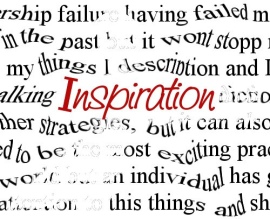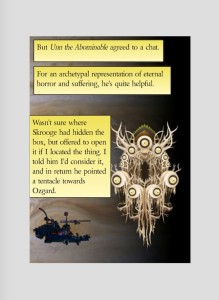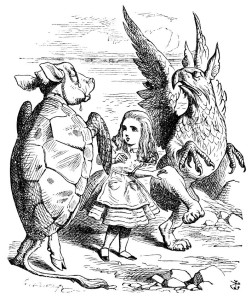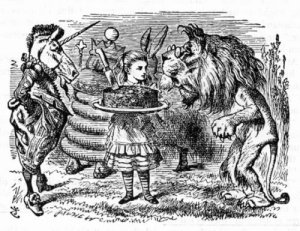
Poet John Reinhart lives in Denver, Colorado and has several collections out.
In an attempt to write more frequently in my blog, I’ve decided to do some interviews with poets who write speculative verse. That’s fantasy, SF, horror and the subgenres. My first interviewee is with John Reinhart, who recently edited an issue of the Science Fiction and Fantasy Poetry Association’s (SFPA) Eye to the Telescope #25, the “garbage” issue. Following, italics are me, with John’s responses.
Let’s start with you telling me when you first found a love for poetry and what were you reading?
My first pen was dipped in the pain of puberty, followed closely by a 50-pound IBM Selectric that wrote in smoke. Writing in flailing and fits, I continued to drivel through high school, even submitting for publication. Then, mercifully, I put my words to other use. My next foray into verse came 15 years later, coinciding with the birth of my daughter. I quickly realized that the development of the internet and online submissions had changed the face of publishing since my typewriter days. My earliest favorite poet was Robert Service, which says little about my subsequent writing except my love of quirky humor.

John Reinhart’s collection screaming, available at Amazon.
So you’re saying you dipped your pen into the pain of puberty? That does sound painful. Did Robert Service inspire you to write or were you already writing and he inspired you to greater heights? On that point, which authors in your formative years caused you stretch your poetic wings? And what was your first published poem?
Actually, I was inspired to do my earliest writing (short stories) after reading Jay Williams’s “Danny Dunn” books. My sci-fi interest continued to develop with Robert Heinlein, Andre Norton, Ursula K. LeGuin, Arthur C. Clarke. Mostly I wrote rhymed garbage those early years, including a poem about pipe smokers that was published in the Pipe Smokers Ephemeris. Twenty years later, I learned of the SFPA (then, the Science Fiction Poetry Association).
 As I re-entered the poetry writing and submitting scene, I read Campbell McGrath, Paul Goodman, D.H. Lawrence, Kenneth Rexroth, Russell Edson, and eventually anything else I could get my hands on at the library in an attempt to expand my poetic experience and teach myself about modern poetry. After I was awarded the 2016 Dark Poetry Scholarship from the Horror Writers Association, I actually took a poetry course, but the last poetry course I had previous to that was in high school. To date, I have published a collection about people around me, an experimental collection, a prose poetry collection, and two speculative collections. I like to think that I absorb everything I read and earthworm it into new substance to fuel new views of our technicolor world.
As I re-entered the poetry writing and submitting scene, I read Campbell McGrath, Paul Goodman, D.H. Lawrence, Kenneth Rexroth, Russell Edson, and eventually anything else I could get my hands on at the library in an attempt to expand my poetic experience and teach myself about modern poetry. After I was awarded the 2016 Dark Poetry Scholarship from the Horror Writers Association, I actually took a poetry course, but the last poetry course I had previous to that was in high school. To date, I have published a collection about people around me, an experimental collection, a prose poetry collection, and two speculative collections. I like to think that I absorb everything I read and earthworm it into new substance to fuel new views of our technicolor world.
We grew up on the same authors. Congratulations on receiving the scholarship. You’ve  named a lot of published collections. Have you published individual poems in magazines or anthologies where people can search them out? Oh, and where do you hail from?
named a lot of published collections. Have you published individual poems in magazines or anthologies where people can search them out? Oh, and where do you hail from?
I have spent most of my life in Denver, Colorado. I did achieve escape velocity once, but drifted back into orbit and found the Rocky Mountain gravitational pull too strong. I’m rebooting the engines as we speak.
My work has been featured in recent issues of Crannog, Pedestal Magazine, Liquid Imagination, Holy Shit, Grievous Angel, Quatrain.Fish, and many issues of Star*Line and Scifaikuest. I was particularly touched to land a couple poems in A Poet’s Siddur, alongside a poem by Leonard Cohen.
What would you say is the most important thing about poetry as compared to fiction?
The most important thing about poetry, as compared to fiction, is that I can compose a poem in less time and space than I can compose a short story. Black holes condense matter into meaninglessness, sucking in enough light to exhale in humorous high tones like people do at birthday parties with helium balloons. What we wheeze out of the ordinary vegetable universe ought to be blood out of turnips: poetry.
Would you say you have a particular style of poetry that you write, or topics that you explore?
I hope for my poetry to open new perceptions into our technicolor vegetable universe. Frequently, I utilize sci-fi/fantasy/horror as a means to highlight social issues, of which I think that observing and knowing our world is primary.
In terms of style, I often lean on humor in my observations and reflections on the daily mundane elevated to poetry. Though I have a fine selection of scifaiku in print, I tend to write free verse, with a special love for villanelles.

Reinhart has written SF, fantasy and horror poetry.
What would be the one piece of wisdom you would pass on to any aspiring poet? And last, is there anything else about poetry that you’d like to say that I haven’t asked, or upcoming works you’d like to chirp about?
For aspiring poets – write, read, write more, read more. Submitting—and submitting frequently—is a good way to engage in the contemporary poetry scene, which should encourage you to read what appears in journals and online as well as the books you find at the local library. Find authors you love and read everything they have. Find authors you dislike or don’t understand, and read everything they have. Honestly, I love to write poetry. I like what it does to me, how it shapes my perceptions and changes my interactions with the world. That part is awesome. But it’s balanced with my thorough appreciation of walking this weird path with so many other talented and gracious artists. I leap at chances to meet up with other poets, regularly exchange emails with poets across the world, and revel in the beautiful work that shows up everywhere, if you dig below the surface.

- John likes to use humor as a lens through which he writes some of his poems.
I have two collections coming out shortly: dig it (Lion Tamer Press), and arson (NightBallet Press). dig it fulfills a goal at Patreon, where my patrons helped me reach a funding goal at which point I promised to self-publish a full-length collection. To date, this is my longest collection. As with my previous collection, screaming, this one veers away from much of my earlier form, though eccentricities and humor still make regular appearances. arson is a chapbook-length take on my multifaceted understanding of arson. It starts with a poem/syllabus on Arson 101.
Thanks, John. Check out John’s works through the links above and through Amazon. If you are a published speculative poet, feel free to contact me for an interview.






 In the space of just under 40 years, so much has changed. Girls’ house league and rep teams abound in many areas of Canada. Women’s hockey is now in the Olympic Games—something that I would have found difficult to imagine in the late 1970s.
In the space of just under 40 years, so much has changed. Girls’ house league and rep teams abound in many areas of Canada. Women’s hockey is now in the Olympic Games—something that I would have found difficult to imagine in the late 1970s. Fan participation in certain aspects of sport has broadened—all-star voting, for example, or fantasy leagues, in which fans get to pick their “dream team” and see how they perform. The Olympic Games now include events like aerial skiing or half-pipe snowboarding, sports that weren’t even a thing back when the modern Olympics were re-vitalized in 1896. And, of course, there are increasingly sophisticated sports-themed video games, a notion that seemed light years distant back in the 1970s when we thought Atari’s Pong was a big deal.
Fan participation in certain aspects of sport has broadened—all-star voting, for example, or fantasy leagues, in which fans get to pick their “dream team” and see how they perform. The Olympic Games now include events like aerial skiing or half-pipe snowboarding, sports that weren’t even a thing back when the modern Olympics were re-vitalized in 1896. And, of course, there are increasingly sophisticated sports-themed video games, a notion that seemed light years distant back in the 1970s when we thought Atari’s Pong was a big deal.




 As I re-entered the poetry writing and submitting scene, I read Campbell McGrath, Paul Goodman, D.H. Lawrence, Kenneth Rexroth, Russell Edson, and eventually anything else I could get my hands on at the library in an attempt to expand my poetic experience and teach myself about modern poetry. After I was awarded the 2016 Dark Poetry Scholarship from the
As I re-entered the poetry writing and submitting scene, I read Campbell McGrath, Paul Goodman, D.H. Lawrence, Kenneth Rexroth, Russell Edson, and eventually anything else I could get my hands on at the library in an attempt to expand my poetic experience and teach myself about modern poetry. After I was awarded the 2016 Dark Poetry Scholarship from the  named a lot of published collections. Have you published individual poems in magazines or anthologies where people can search them out? Oh, and where do you hail from?
named a lot of published collections. Have you published individual poems in magazines or anthologies where people can search them out? Oh, and where do you hail from?














